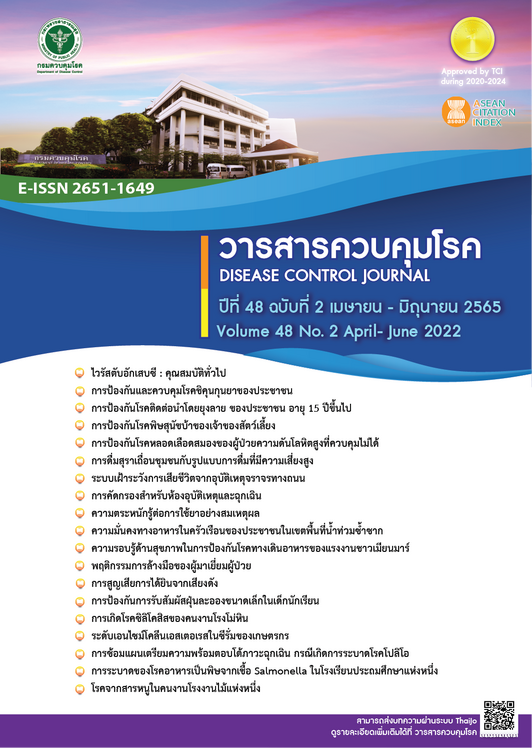Effects of hand hygiene education on hand hygiene behavior of visitors
DOI:
https://doi.org/10.14456/dcj.2022.32Keywords:
Hand hygiene knowledge, Hand hygiene behavior, VisitorsAbstract
The objectives of the study were to compare the hand hygiene knowledge and behavior between pre-education and post-education and to study the opinion of visitors about the problem and solution for handwashing. Forty-three visitors were selected by purposive sampling from the medical-surgical unit of Sanam Chai Khet Hospital. The research instruments were the hand hygiene knowledge and hand hygiene behavior questionnaires. Data were analyzed by frequency, percentage, means, standard deviation, and paired t-test was conducted to compare the different between pre and post-education. The result showed that the knowledge of pre-education was at medium level (x=11.30, SD=1.23), and the knowledge of post-education was at high level (x=13.20, SD=1.01) with statistically significant difference (p<0.05). The hand hygiene behavior of respondents in pre-education was at high level (x=2.81, SD=0.57), and in post-education was at high level (x=3.00, SD=0.42) with no statistically significant difference (p>0.05). Most of the respondents suggested that an alcohol hand rub should be provided beside the patient’s bed as well as scatter around the wards. Therefore, nurse managers and infection control nurses should utilize the collected data for hand hygiene training plan for visitors to increase the knowledge and having correct health behavior as well as provide sufficient equipment to promote hand hygiene for visitors.
Downloads
References
World Health Organization & WHO Patient Safety. WHO guidelines on hand hygiene in health care [Internet]. Geneva: World Health Organization; 2009 [cited 2020 Dec 5]. 270 p. Available from: https://apps.who.int/iris/handle/10665/44102
Unahalekhaka A. Infection prevention in hospital. Bankok: J.C.C. Company Inc; 2005. (in Thai)
Boyce JM, Pittet D. Guideline for hand hygiene in health-care settings [Internet]. 2002 [cited 2020 Dec 5];51(RR16):1-44. Available from: https://www.cdc.gov/mmwr/preview/mmwrhtml/rr5116a1.htm
Birnbach DJ, Nevo I, Barnes S, Fitzpatrick M, Rosen LF, Everett-Thomas R, et al. Do hospital visitors wash their hands? assessing the use of alcohol-based hand sanitizer in a hospital lobby. Am J Infect Control. 2012;40(4):340-3.
Birnbach DJ, Rosen LF, Fitzpatrick M, Arheart KL, Munoz-Price LS. An evaluation of hand hygiene in an intensive care unit: are visitors a potential vector for pathogens. J Infect Public Health. 2015;8(6):570-4.
Faculty of Medicine Ramathibodi Hospital Mahidol University. Basic knowledge COVID-19 fundamentals: part 1 COVID-19 disease, illness, treatment, prevention and transmission of infection [Internet]. 2020 [cited 2020 Dec 15]. 16 p. Available from: https://www.phoubon.in.th/covid-19/ความรู้เรื่อง%20COVID%20รามา.pdf (in Thai)
Centers for Disease Control and Prevention. global hand washing day [Internet]. 2020 [cited 2021 Jul 28]. Available from: https://www.cdc.gov/handwashing/global-handwashing-day.html
Thongchuea B, Khamfu P, Thanomphan S. Effects of hand washing program on knowledge and practice of prevention and control of multi-drug resistance organisms among nursing personnel, patients, and care-givers in Surgical and Orthopedic Department in Nakornping Hospital. J NAT North [Internet]. 2017 [cited 2022 Jan 11];23(2):12-5. Available from: https://he01.tci-thaijo.org/index.php/jnorthnurse/article/view/195722
Sirisuwan P. Effects of health promotion programs for prevention new case of diabetes mellitus in a diabetes risk group in Singkok sub-district, Kasetwisai district, Roi Et province. Journal of Boromarajonani College of Nursing. 2018;8(1):45-58. (in Thai)
Aigbiremolen AO, Abejegah C, Ike CG, Momoh JA, Lawal-Luka RK, Abah SO. Knowledge and practice of hand washing among caregivers of under-five children in a Rural Nigerian Community. Public Health Research [Internet]. 2015 [cited 2021 Feb 5];5(5):159-65. Available from: http://article.sapub.org/10.5923.j.phr. 20150505.06.html
Downloads
Published
How to Cite
Issue
Section
License
Copyright (c) 2022 Disease Control Journal

This work is licensed under a Creative Commons Attribution-NonCommercial-NoDerivatives 4.0 International License.
Articles published in the Disease Control Journal are considered as academic work, research or analysis of the personal opinion of the authors, not the opinion of the Thailand Department of Disease Control or editorial team. The authors must be responsible for their articles.






